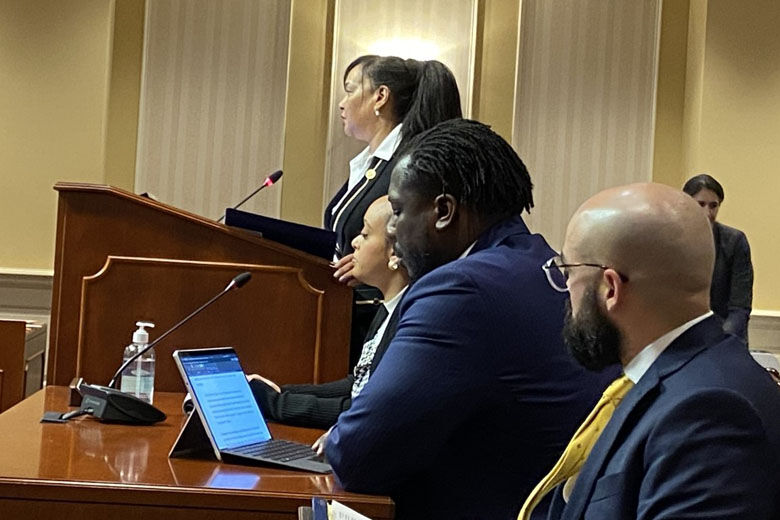This article was republished with permission from WTOP’s news partners at Maryland Matters. Sign up for Maryland Matters’ free email subscription today.
This content was republished with permission from WTOP’s news partners at Maryland Matters. Sign up for Maryland Matters’ free email subscription today.
Rusty Carr of Mount Airy stood before the Maryland Senate Judicial Proceedings Committee and hoisted a 3 1/2 gram container of cannabis he uses for medical purposes, specifically for chronic pain.
“If you have questions, I will allow you to smell if you’d like. I have samples to compare,” he said, suggesting that the odor is not as strong as people think.
Carr testified at a hearing Thursday in support of Senate Bill 51, which would prevent law enforcement officers from stopping a motorist based on the scent of cannabis without evidence that the motorist is intoxicated or without another valid reason.

Sponsored by Sen. Jill Carter (D-Baltimore City), the bill also would prohibit police from using some other reasons as cause for a stop, including possession of cannabis, suspicion that the person possesses cannabis and the presence of money near cannabis.
Carter said it would ensure Black and Latino motorists aren’t targeted, which “would reduce the opportunities for officers to conduct racial profiling.”
The bill is under consideration after Maryland courts have ruled differently on stop and search procedures for marijuana.
Two years ago the Maryland Court of Special Appeals, now called the Maryland Appellate Court, ruled that police couldn’t stop a person based on the smell of cannabis.
But last year, the Maryland Court of Appeals, now called the Maryland Supreme Court, overruled the appeals court, deciding that police could stop someone if they smelled cannabis. However, the state’s top court said that law enforcement must let motorists go if they could not determine whether a stopped motorist had more than 10 grams of cannabis.
“I believe it’s our responsibility in Maryland to give guidance to our courts. This is a matter of public policy,” Carter said.
Under a measure Maryland voters approved in November to make recreational use of cannabis legal as of July 1, a person 21 years and older will be allowed to possess up to 1.5 ounces of marijuana and grow two marijuana plants out of public view.
However, the legislature must approve a framework for regulating and taxing cannabis before the session ends April 10.

A fiscal note drafted by the state Department of Legislative Services notes that the average cost to hold an inmate is $4,970 per month and that expenditures may decrease because fewer people may be incarcerated.
Revenues would also decrease with fewer fines imposed and collected.
In advance of and in response to Thursday’s hearing, the ACLU of Maryland issued a statement noting that the recent death of Tyre Nichols, after he was stopped and beaten by five Memphis police officers, “is yet another chilling reminder of the need to limit police interactions.”
Sen. William Folden (R-Frederick County), a Frederick police officer, said the legislation would limit “certain investigative tools” for law enforcement.
“Recreational [cannabis] use is legal. I get it, but we’re putting the cart before the horse and we’re not allowing the proper things in place to be able to properly monitor and keep the roads safe,” he said.
Carter told Folden law enforcement officers could still request a driver to pull to the side if they notice a motorist swerves on the road, for example.
“This isn’t saying that there’s no circumstance in the world where odor can’t be a factor,” she said. “But we’re saying it can’t be the stand-alone reason” to pull someone over.
Carter and other supporters emphasized that it is difficult for an officer to determine how much cannabis a person has based solely on the scent.
But Folden said he “would like to think that there’s times you can walk by a car and it’s a pretty strong odor, and it’s probably more than the amount that’s [allowed] for recreational use because it’s that strong.”
Carter disagreed.
“It’s unquantifiable,” Carter said. “That’s not something you can determine.”







